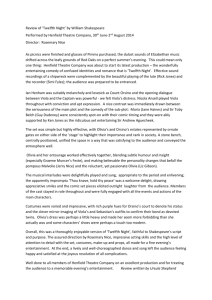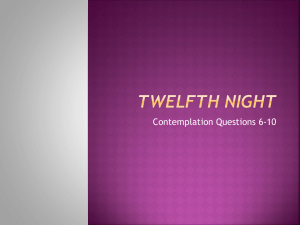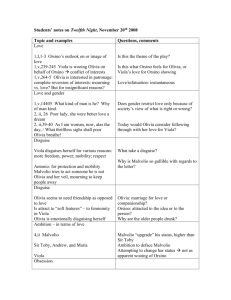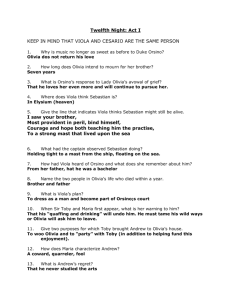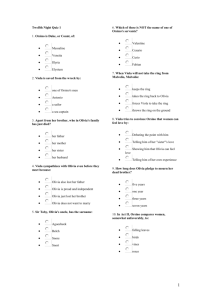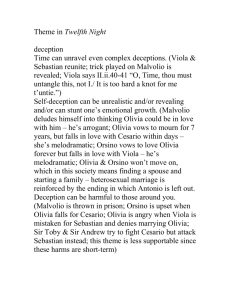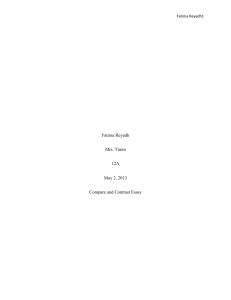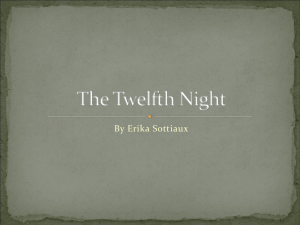Ilyssa Silfen
advertisement
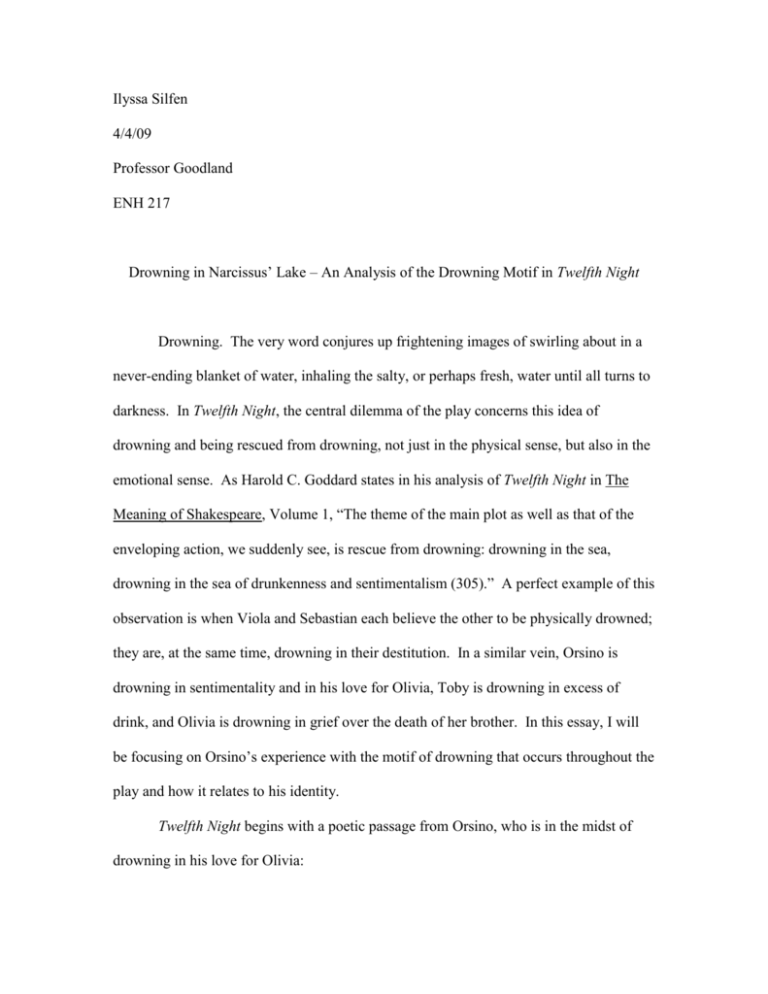
Ilyssa Silfen 4/4/09 Professor Goodland ENH 217 Drowning in Narcissus’ Lake – An Analysis of the Drowning Motif in Twelfth Night Drowning. The very word conjures up frightening images of swirling about in a never-ending blanket of water, inhaling the salty, or perhaps fresh, water until all turns to darkness. In Twelfth Night, the central dilemma of the play concerns this idea of drowning and being rescued from drowning, not just in the physical sense, but also in the emotional sense. As Harold C. Goddard states in his analysis of Twelfth Night in The Meaning of Shakespeare, Volume 1, “The theme of the main plot as well as that of the enveloping action, we suddenly see, is rescue from drowning: drowning in the sea, drowning in the sea of drunkenness and sentimentalism (305).” A perfect example of this observation is when Viola and Sebastian each believe the other to be physically drowned; they are, at the same time, drowning in their destitution. In a similar vein, Orsino is drowning in sentimentality and in his love for Olivia, Toby is drowning in excess of drink, and Olivia is drowning in grief over the death of her brother. In this essay, I will be focusing on Orsino’s experience with the motif of drowning that occurs throughout the play and how it relates to his identity. Twelfth Night begins with a poetic passage from Orsino, who is in the midst of drowning in his love for Olivia: If music be the food of love, play on. Give me excess of it, that, surfeiting, The appetite may sicken and so die. (Twelfth Night 1.1.1-3) Orsino, at this point, could be seen as lying on a couch in the throes of lovesickness, tossing and turning restlessly as he drowns in sentimentality. It is important that Orsino mentions the word “excess” in this passage; even though the words “drown” and “water,” in any of their forms, are not mentioned in this part of the passage, the idea of Orsino being given music, which is the “food of love,” in excess shows us that he feels utterly overwhelmed by his feelings for Olivia, which are most definitely unrequited. The words “appetite” and “surfeited”, which means “satisfied” or “glutted (N2-3),” are also important words; in context with the poetic passage, he is telling his court to give him an excess of the food of love (music) so that he might become so overwhelmed that his passion for Olivia might subside, and he might achieve some rest from his longing. In this way, he is asking his court to help rescue him from drowning in his sentimentalism. Later on in the same passage, he compares love itself to drowning in the ocean, this time using the image of the sea as a metaphor for love’s affect on him: O spirit of love, how quick and fresh art thou, That, notwithstanding thy capacity Receiveth as the sea, naught enters there, Of what validity and pitch soe’er, But falls into abatement and low price Even in a minute. So full of shapes is fancy That it alone is high fantastical (Twelfth Night 1.1.9-15) This passage has Orsino describing love as a hungry creature that devours everything and destroys the value of even the most precious things (N14-15). The fact that the spirit of love “receiveth as the sea” brings to mind once again the image of Orsino drowning in his love for Olivia. The phrase “high fantastical” can refer to both “highly imaginative, most able to create powerful images,” and “extremely passionate (N14-15);” in this part of the passage, it appears that Orsino is playing with the double meaning of the phrase in order to portray the intensity of his love for Olivia. By exploring the idea of love conjuring powerful images in his mind and of being extremely passionate at the same time, he continues to explore the idea of drowning in an excess of love. Later on in the play, Orsino’s sentimentality continues in its intensity. In Act II, scene iv, he speaks to Cesario, who is Viola in disguise, about the differences in love and passion between men and women, and he makes a strong proclamation about the passion that resides in his heart: There is no woman’s sides Can bide the beating of so strong a passion As love doth give my heart; no woman’s heart So big, to hold so much; they lack retention. Alas, their love may be called appetite, No motion of the liver, but the palate, That suffer surfeit, cloyment, and revolt; But mine is as hungry as the sea, And can digest as much. Make no compare Between that love a woman can bear me And that I owe Olivia. (Twelfth Night 2.4.103-113) This passage demonstrates a change in Orsino’s identity from the first act. When speaking of his passion for Olivia in the first passage of the play, he is very melancholy and lovelorn; his actions and expressions of love for Olivia are very much subdued. However, when speaking to Cesario/Viola, he becomes more fired up and more expressive, both verbally and possibly physically in his declarations. At the very beginning of this passage, he declares with fire that no woman would be able to bear the brunt of the love that resides within his breast; the phrase “no woman’s heart/ so big, to hold so much; they lack retention (105-106)” insinuates that if a woman were to try to handle the love that he holds within him, she would drown in it. This might seem to insinuate that Orsino is no longer drowning in his love for Olivia, in that his statement that a woman would drown in his love insinuates that he is no longer drowning; however, he repeats the image of the sea and its never-ending appetite from Act I, scene i in the line, “But mine is as hungry as the sea, and can digest as much (110-111).” This passage demonstrates the increasing complexity of Orsino’s thoughts and feelings; in one sentence, he’s proclaiming that a woman could not handle the love he has in his heart, implying that he has some semblance of control, but in another, he’s repeating the image of the sea, which at this point has become a metaphor for his love for Olivia taking over him. In the final act, Act V, Orsino’s identity goes through a complete tailspin. At this point in the play, all of the misunderstandings are coming to light and being resolved, but before this can happen, there must be some sort of conflict. One of the conflicts that occurs for Orsino occurs between him and Olivia. Orsino, by this time, is in love with both Olivia and Cesario/Viola, although the latter is much more subtle; however, when confronted with the fact that Olivia will never yield to his advances, he confronts Olivia in turn: Why should I not, had I the heart to do it, Like to th’ Egyptian thief at point of death, Kill what I love?—a savage jealousy that sometimes savors nobly. (Twelfth Night 5.1.119-122) His love for Olivia, at this point in the play, has grown from subdued in its passion to fiery in its expression to jealous and angry in its ending. At this point, instead of drowning in sentimentality, he is drowning in anger towards Olivia; he has realized that she will never acquiesce to his longing for her, his offerings, and his proclamations of love. The first part of the passage alludes to a novel by Heliodorus, in which the robber chief, threatened with death, tries to kill the woman he loves to prevent her from being taken by another (N120). This demonstrates the insane amounts of jealousy and anger Orsino holds towards Olivia, even for that brief moment, and the words “savage jealousy” indicate that the feelings are overwhelming, much like his original love for Olivia was, and indicate that he is now drowning in these newfound emotions in love’s place. Later on in the act, when Viola’s true identity is revealed, a sense of relief is more than apparent in Orsino’s countenance, and it feels as though he has been rescued from drowning in his love for Olivia by learning of Viola’s true identity: Your master quits you; and for your service done him, So much against the mettle of your sex, So far beneath your soft and tender breeding, And since you called me “master” for so long, Here is my hand. You shall from this time be Your master’s mistress. (Twelfth Night, 5.1.336-343) In this particular passage, no mention of or allusion to drowning or the ocean is mentioned, and this is extremely important; it is the lack of that sort of imagery that reveals that the disclosure of Viola’s identity has also changed Orsino’s identity by removing his unhealthy obsession with Olivia and replacing it with a healthy love for Viola; she has essentially saved him from drowning. In many of his passages that speak about love, he has mentioned the motif of drowning and has mentioned the ocean as a metaphor for love, devouring anything and everything in its path. However, when he realizes his love for Viola, none of these things are mentioned, which demonstrates that his love for Viola is much different from his love for Olivia; it is a healthy love, in which he can bathe rather than drown. Orsino’s love for Olivia could be compared to Venus’ love for Adonis in the epic poem Venus and Adonis, also by Shakespeare. Both characters yield an unhealthy obsession for the object of their affection, to the point that they begin to drown in their emotions, and both go to great lengths to obtain the same affection from the person they desire. In both pieces of literature, the obsessive character winds up losing the object of their affection due to circumstances beyond their control, and that loss, in turn, changes the identity of the character who is in love. In Venus and Adonis, it was death that took Adonis away from Venus; you could even say that Venus wound up unintentionally drowning Adonis in her affections. Venus’ countenance and outlook on life immediately changed upon his demise; rather than loving life and appreciating the beauty of love, she began to drown in her sadness, and thus returned to her home and renounced love, declaring that it would always be filled with tragedy and despair. Fortunately for Orsino in Twelfth Night, he managed to keep his head above water, so to speak, and get his happy ending; it’s true that he lost Olivia, but losing her meant gaining Viola, the woman who would truly love him ‘til death did they part, and renouncing the part of his personality that caused him to needlessly drown himself in sentimentality and sorrow. Works Cited Goddard, Harold Clarke. The Meaning of Shakespeare, Vol.1. Chicago: University of Chicago Press, 1951. Shakespeare, William. Twelfth Night. Edited by Barbara A. Mowat and Paul Werstine. New York: Washington Square Press, 1993. Mowatt, Barbara A. and Werstine, Paul. Notes, Twelfth Night. Edited by Barbara A. Mowatt and Paul Werstine. New York: Washington Square Press, 1993.
